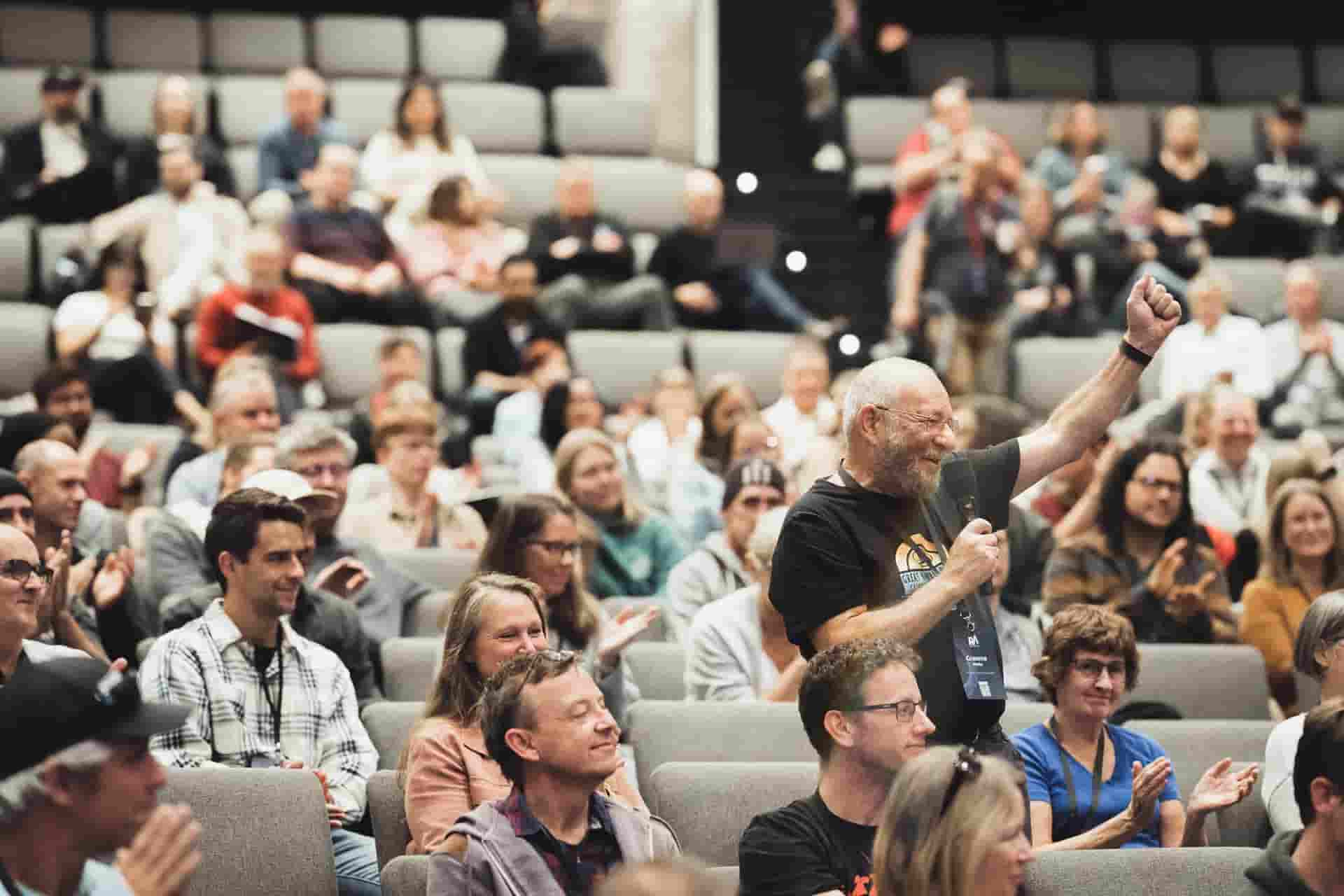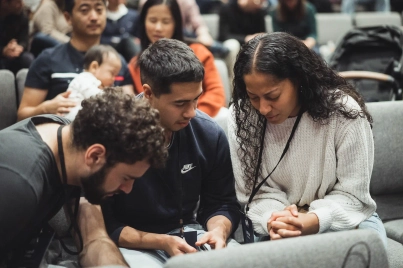So you want to reach the lost with the Gospel? Fantastic!
Evangelistic courses have been proven to be an effective method of doing so particularly in a post-Christian culture.
The following are 12 small but crucial steps you can make to ensuring you maximise the effectiveness of your evangelistic course.
1. Overview – what, where, when and how?
Which course?
The first decision that needs to be made is which course? There are several excellent options: Christianity Explored, Introducing God, Life Explored, LIFE, Explaining Christianity and so on. Alternatively you could write your own course.
Key questions to ask when selecting a course are: content, delivery and length.
Content: The content is crucial: do you believe this course explains the gospel of Jesus Christ in a clear, articulate, simple yet compelling fashion? Will the language utilised suit your specific demographic?
Delivery: Most courses offer two alternative avenues you can show a pre-recorded video, with set discussion questions or you can read the script of the video as a short talk, followed by questions. My preference is, as long as you have an engaging and articulate preacher, to give the talk yourself. You are then able to read the audience, and add in or take out any illustrations or applications which would be culturally irrelevant.
Length: How long is the course? Whilst many courses are upwards of 8 weeks (some including a weekend away) in my experience, the shorter the better. It makes it easier to run them on a regular basis, is an easier nvitation’ for your congregation to give to their friends, and probably (anecdotally) increases the odds of someone saying ‘yes’ to an invitation. In order to slowly, clearly, explain the gospel you will still need some time though. I would recommend a course between 4 to 6 weeks.
Where?
The next decision is the venue. Where at all possible, it is most effective to run the course at the same location your church meets on Sunday. This makes follow up invitations to course attendees to visit on a Sunday service more simple. It also helps de-mystify church buildings. If this is not possible: a venue close to your Sunday location, where people can sit in comfort for over an hour, you are able to serve food and drink, and suitable for your sound and AV requirements are all worthy of your consideration. Meeting in a busy café which remains open for business with all of it’ sounds and visual distractions would not be recommended.
When?
This will depend on your specific context. If you are a church, any mid week evening time. If you serve dinner, start at 7pm. If coffee and dessert, start at 730pm. If you are a university or parachurch ministry, it might be more suitable to run the course during the day, at an appropriate time. Regardless: what is crucial is that you start and finish on time.
Plan the night
What will your time together look like? Will it be an informal chat, cuddled around a tv watching a presenter, with some questions afterwards? Or will it be a full scale production with live music and a smoke machine?
I would like to encourage you to consider these courses in the same vein we might once have thought about one off evangelistic meetings and events. At those events we’d ensure things were done to a good standard to maximise the effectiveness of the night.
It is helpful to consider your evangelistic course as your key church event: which means that effort and energy should be put in towards making the night as appealing as possible. Whilst there’ nothing wrong with having a few people sit around and discuss a video presentation the truth is, it can be intimidating for a lot of people, especially those who aren’t used to sharing their feelings and thoughts in a group.
Therefore, planning the course as an event will help you think bigger than what you might have done in the past. This ethos feeds into the when, where, and how you do what you do each night.
Recruit a team
Recruiting your team is a crucial part of this process. Often, churches run evangelistic courses with solely the presenter, plus one other to look after additional logistics. However, when it comes to evangelistic courses, the more people involved, the merrier.
Roles that your team should fill:
- Hosts: Hosts are Christians from your church whose role is to welcome, chat with, make comfortable, and seek evangelistic opportunities with your guests. Aim for a minimum of 50/50 host to guest ratio to ensure all your guests are being cared for.
- MC: The MC is the person who welcomes everyone, explains the structure of the night, and is a point of contact for any additional guest questions. They can also introduce the video, if that method is used.
- Speaker: The Speaker is the person who presents the content of the course. They should be a clear, engaging and passionate preacher of the gospel. The Speaker should also be prepared for any questions.
- Cooks/ Caterers: The cooks and caterers provide the food and drink for the evening. They should not be the same people as hosts. They should also be prepared to help with setting up, and clearing up the food and plates.
Your team should be recruited and then you should spend at least one (if possible, more) evening in training. The training should include the conduct of the event in addition to evangelistic training. This training should take place prior to every course that you run.
The dual benefit
By this point, you might be seeing why courses are not just excellent as an opportunity to explain the gospel to some guests but, utilised correctly, they can be modes of incredibly effective evangelistic training for your hosts. They will be trained in how to effectively articulate the gospel, they will hear it explained clearly and then they will immediately have opportunities to practice what they’ve been trained in.
Advertise
How will you advertise your event? Considering most guests will attend through either personal invitation from a Christian, or through hearing it advertised on a Sunday they happen to be at church, most thought should be given to galvanising your congregation, and equipping them to invite people they know. You will need to start advertising up the front during Sunday services from approximately no later than 5 weeks out of the event. Provide post-cards with the date and times of the event and place them on seats for 2 consecutive weeks. The announcement doesn’t need to be long or emotional, perhaps something like;
If you’re a visitor or a guest here today or perhaps you’ve been coming here for a while but you’re still unsure where you stand with God or perhaps you’re really not sure about the truth about Jesus we’d love to invite you to our upcoming Explaining Christianity course. It starts on Tuesday, 19th October, and runs for 4 Tuesdays. Come along, have some coffee and dessert and ask any questions you want or maybe, if you want, just come and listen. If you’d like to find out more, ask me after the service, or go to the info desk.
(tip don’t tell people to ‘speak to pastor X’ or ‘chat to Rev w’ because if they’re guests: they don’t know who that is!)
Your preacher should also look for opportunities to encourage people to attend in his sermons, perhaps after an explanation of the gospel.
Of course, there are other means of advertising that can and should be employed: your website should have updated and clear information, your social media presence should also promulgate the course.
However, make no mistake it’ the people sitting in front of you every Sunday who will bring the most guests along: and so every opportunity to actively individually or corporately encourage them to bring people should be taken.
Invite church members
Inviting church members Christians to your evangelistic course seems counter-intuitive. After all, they’re converted! And surely this might make the genuine guests feel intimidated?
In my experience, there are 3 huge positives to getting as many Christians from church to attend, not as hosts, but as observers.
- Buy in: When they see the course, they’ll hopefully see not only is it excellently done but that it works: and it’ exactly the kind of course they could invite their contacts to.
- For guests: The more people in the room, the safer and more anonymous the non Christian guest feels. Not to mention most of them wouldn’t have a clue that others in the room are Christians or not.
- Potential hosts: The Christians who attend the course are not just potential inviters – but potential hosts. The week after the course finishes, follow them up and see if they’d like to get involved as a host in the next course.
One crucial tip: if you do have Christian guests attending, gently inform them that they are not to ask questions in the q and a time, nor are they to continue the answer the speaker has given. This is not the time nor the place for that.
The vibe
Vibe matters. Ask anyone who works in entertainment or hospitality getting the right ‘feel’ as people arrive is crucial.
The room should be fully set up prior to hosts arriving. Ensure your hosts arrive 30 min prior to the course, and are prepared to be on the look out to chat to guests as they arrive. Upbeat, light music should be playing in the background; for some reason it makes awkward situations more comfortable. Have someone located on the front door as a greeter, and potentially the door to the room you’re utilising to hand out pens, booklets, name tags etc. Depending on whether you’re using dinner, or coffee and dessert will affect what happens here: but take up to half an hour to serve people, and to also ensure people are chatting and being welcomed. Keep an eye out for any guest left on their own and not included in conversation.
Dim the music, the MC should say hello and welcome people, and introduce the speaker.
Following the presentation, plus and q and a or discussion time, light music should be put back on to make people comfortable in sticking around and chatting and either the MC or the speaker should stay near the door as people leave, thanking them for coming, and that you’re looking forward to seeing them next week.
The talk
We’ve already discussed the different formats available to us in most courses. Utilising the well produced video has it’ advantages: however, my personal preference is giving a talk in person. It generally means you can adapt the context more specifically to who is in front of you; and also gives you authority in the q and a time.
If you do decide to do the talk in the person let me encourage you that you ensure the preacher is as well rehearsed as possible. These talks are as important as any that will be given in ones life and as such, should be given with every ounce of communicative clarity and skill possible. This can be tricky if you’re utilising a script that has been written by someone else; however extra rehearsal should ensure you make the material your own.
Good, readable powerpoint slides are crucial. Many people are visual learners: and so ensuring your slides are clear, relevant, and look good makes a difference.
Q + A/ discussion time
There are several options regarding how you conduct the following q + a or discussion time. You could split into tables, with each table having a host discussion leader reading through some pre-written questions, or perhaps raising any questions for the q and a time. Alternatively you could go from the talk immediately to an open q and a between the attendees and the speaker: discussion would then be informally conducted following the finish of the formal time between hosts and attendees.
My preference is the immediate q and a followed by hang out. Many people feel socially uncomfortable with discussing in small groups: and so allowing them to sit back and be anonymous if they choose to be has been fruitful in the past. However, I’ve seen both versions work.
The response
Following the course, it is important to offer the participants an opportunity to respond to the gospel. Most courses have an opportunity to pray a prayer of repentance and faith at the completion of the time together.
How do you find out where the guests are at following the course? The best way I’ve seen this done is by using feedback forms, with very specific ‘diagnostic’ questions that help reveal where they stand with God. Assure the guests that these forms are confidential, and that they can reveal where they’re at honestly without fear of our judgement. These forms are very helpful in effectively following up our guests.
2. The follow up
Once your course is over, what happens next?
Regardless of the response of the guests, having a follow up pathway structure in place is imperative. Many of the guests in the course would have heard enough to be interested, but not committed yet; whilst some may indeed have come to the Lord.
The most effective mode of follow up I’ve witnessed is the after-course bible study group. This is a group specifically tailored and designed for new and non Christians. This group will meet at the same location (if possible) the next week, at the same time but utilising a different format. It is helpful to bring the follow up bible study leaders up to the front at the end of the course and briefly interview them. Even better is if these leaders have been hosts for the specific course, so people have got to know them.
At the end of the course, but before the feedback form, the speaker can say something like:
We’ve had such a great time we don’t want it to end! So we’re going to meet back here next week and start a bible study. It’ll be different to what we’ve just done less food, no tables but just a relaxed environment to slowly study the bible together. No matter where you’re at with God now, we’d love you to come. If you’re keen, circle the appropriate box on your feedback forms…
There are several options for what content should be used in these groups, and also how long they should go for. In my experience, many people are converted in these groups, as opposed to the course and it takes people much longer than we think to get used to reading the bible, before we throw them in with more mature Christians. We need to protect and care for these people with upmost concern and so I would suggest the groups go for 12 months.
The leaders of these groups must be from amongst your most committed and competent people: they are acting in a traditional bible study leader role, but also working as evangelists within the group. They will require continuous training, support and feedback. Depending on the number of courses you run throughout the year you can have 1 new bible study per course, or perhaps one continuous bible study that starts new material every term so new people can easily join.
3. The debrief
Recruiting, training and equipping your hosts and other leaders is paramount to the success of your course. Providing a time for a debrief with your leaders: with everyone having the opportunity to provide feedback, tell stories, and think through what they might have done differently will go a long way to ensuring your team remain motivated and committed to future courses. This can take place after the last evening: or, even better, the week after at a special, prolonged time together.
4. And repeat. Regularly.
Consistency is key in ensuring that this evangelistic strategy gains traction amongst your church. When starting, plan to have a minimum of 2 courses within your first year. Prioritise inviting members from church to attend as observers, and work hard on recruiting your team of hosts and helpers. From there, having the course dates locked in 12 months in advance ensures that it remains a priority within your church structure, and keeps the ‘rhythm’ of evangelism constantly bubbling away.
How many courses you run per year will depend on your own specific context. Some churches run 4 courses per year (1 per term), and find that suits them well. Others run more, some run less. I would recommend running at least 3 within the 12 month period. No matter how many visitors you get keep going! This is not about immediate change in culture although, God willing, you will see immediate change in peoples eternity’! but long term, durable, sustainable evangelistic effectiveness.



